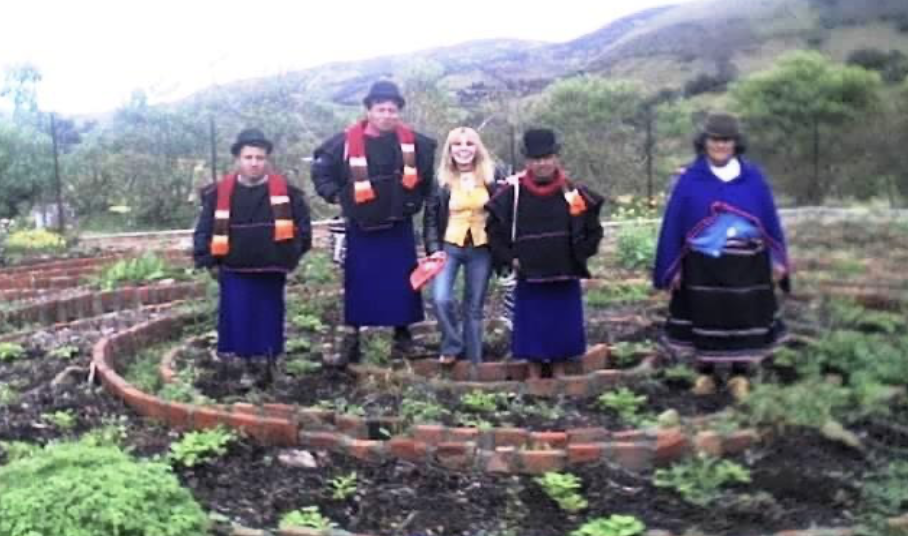INTERCULTURAL SOLIDARITY ECONOMIC CIRCUITS, VITAL ALTERNATIVES
MORE IN THIS SECTION

Photo 1. Lucía Vásquez Celis with delegates of the Misak indigenous people (Guambianos) in Silvia Cauca 2012
In this article, I invite you to learn about a comprehensive vital alternative called “Intercultural Solidarity Economic Circuits” - CESI, a proposal for the articulation of different cultural and ethnic options, aimed at “building a notion of wealth linked to another notion of development. A human-based wealth. A wealth that tells us about people's ability to decide to grow as a group." (Díez Humberto, 2007)
The CESIs walk in South America but have also walked as alternatives in the territories of Italy, France, the Catalan and Basque countries (Social Market in the Basque Country) and in Chios, the Greek island birthplace of Mikis Theodorakis.
BUT WHAT ARE CESI?
The CESI are a set of processes that integrate production, consumption, marketing, financing, technological and human development. The objective of the ESCs is to promote development that is socially just, ecologically sustainable and economically viable. (Lopera García Luz Dolly and Mora Rendón Sol Bibiana 2009)
The CESI are networks of production, distribution and consumption of goods and services and common learning, which operate with ethical, democratic, ecological and solidarity criteria, made up of both companies and entities of the solidarity economy as well as individual and collective consumers (Mance Euclides. 2020. Solidarity economic circuits, moving from the capitalist economy to the solidarity economy of liberation)
PRINCIPLES AND DIMENSIONS OF THE CESI
The construction of comprehensive life alternatives, whose objective is to satisfy fundamental human needs to ensure the reproduction of life in dignity, within the framework of societies based on respectful relationships between people and nature and under principles of solidarity economy: Reciprocity, complementarity and redistribution, between people and nature; - Associativity, organization and collective community work; - Interculturality and construction of autonomy; - The strength of the organized community as a generator of political transformations and new form of more human relations; - The respectful relationship between peoples and nationalities.
RELATED CONTENT
The CESI intervene in several dimensions: - Economic Dimension, from which the economic process is conceived as a solidarity exchange both in the processes of production, transformation, consumption and post-consumption; -- Political dimension that seeks to change the situations and processes of exclusion towards inclusion; - Environmental dimension that implies respectful and reciprocal relationships with nature and the absence of anthropocentrism; - Cultural dimension, which has to do with the construction of identity of political subjects and actors. (Asier Arcos Alonso, 2015)
Although the CESI do not rule out profitability and profit, they place the human being and their relationships at the center of their actions, starting first with the satisfaction of the fundamental needs that allow full human fulfillment. The CESI promote reciprocal relationships between producers and consumers and also consider the spiritual life of people as fundamental; In fact, many of the practices incorporate ceremonies that foster new relationships with God, with Nature and the cosmos. For the CESI it is also important that the children, the family and the community are well and that everyone learns and exchanges knowledge and knowledge. In addition, rest and laughter are encouraged and in the face of selfishness, individual, family and community capacities are enhanced. (Jiménez Jhonny. 2011)
MINIMUM REQUIREMENTS FOR THE CONSTRUCTION OF CESI
Indigenous, Afro, peasant production systems and new urban initiatives, from their multifunctionality, as potentially more equitable and ecologically friendly options compared to large property and monoculture agroindustry due to their insertion in environmental matrices that integrate nature with agriculture , preserve high biodiversity, high biological productivity and because their values and links with the land, seeds, territories, water and their ancestry are fundamental elements that establish an integral and supportive identity and rationality with incidences in the local economies and in the environmental environments that surround these production systems.
It is urgent to transcend family and local activities and impacts towards flows and articulation of social networks of diverse organizations with impact at the municipal, departmental, regional and national levels to configure more complex higher structures that reach levels of autonomy according to their degrees of maturation, and that lead to transcending productive chains towards the integration of financing, production, marketing and consumption processes that allow greater autonomy of the CESI, compared to capitalist organizations and dynamics.
The CESI are presented as spaces for articulation and exchange, not only of products and services but also of knowledge, practices and experiences, becoming a space for relationships beyond the economic sphere where aspects such as care and coexistence become relevant. These circuits are generated through multiple tools such as web pages, meetings, exchange agreements, markets, solidarity fairs, etc.
The CESI articulate different cultural and ethnic options, beyond the merely economic or exclusively satisfying the basic needs of the human being, towards the construction of a society of culture of peace that collects contributions from the “Sumak Kawsay” or process of life in plenitude, in material and spiritual balance and of the “Wet Wet Finse Nxi” or process of life in harmony and reciprocity.
Autonomy as a political, legal, cultural, administrative, financial and comprehensive right and as a fundamental condition for the construction of alternatives that lead to the distribution of power, with the participation of different autonomous and conventional territorial entities. Autonomy also implies transcending the paternalistic relationships promoted by modern colonialism that assumes indigenous peoples, ethnic groups and popular organizations as poor people, barbaric, backward and underdeveloped peoples, with no other way out than to be assimilated by hegemonic culture (Baena Samuel 2015)





LEAVE A COMMENT: